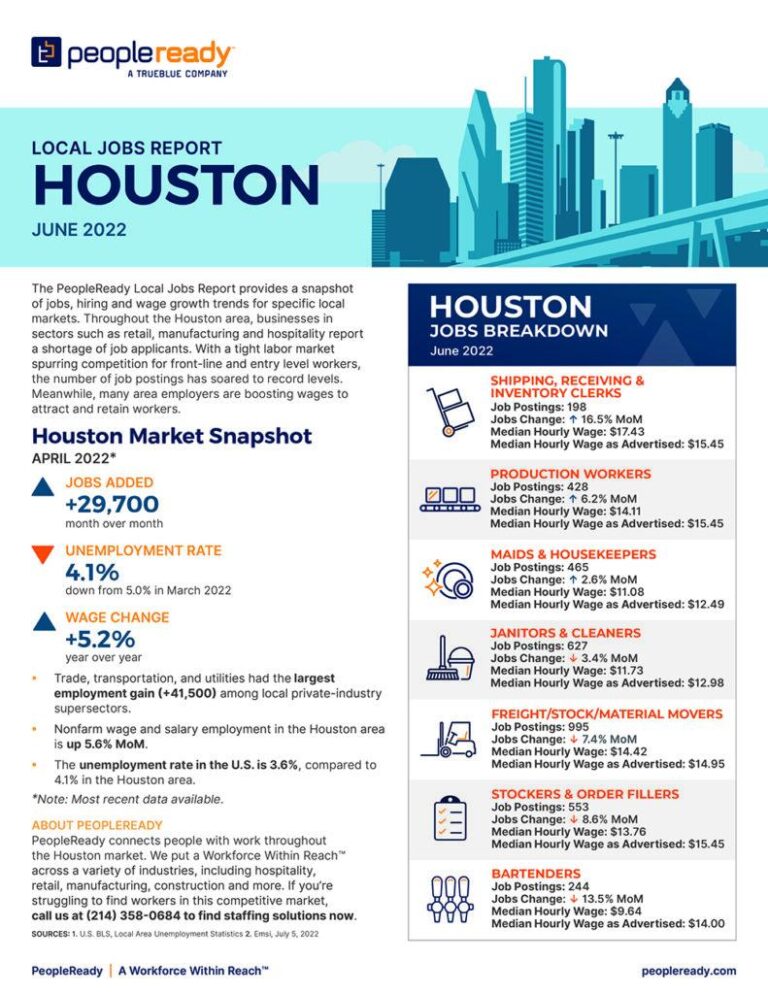HoustonŌĆÖs Employment Landscape: Emerging Trends and Strategic Insights for 2024
The most recent employment data for Houston, unveiled this week, presents a pivotal snapshot that demands the attention of city officials, business leaders, and the community. As Houston maneuvers through ongoing economic transformations and recovery phases, this fresh information sheds light on workforce dynamics and the vitality of the local labor market. KHOUŌĆÖs analysis deciphers the implications of these statistics for the cityŌĆÖs economic trajectory and highlights why all stakeholders should stay engaged.
Surging Job Growth in HoustonŌĆÖs Key Sectors Fuels Economic Momentum
HoustonŌĆÖs latest employment statistics have surpassed forecasts, revealing a vigorous expansion that is redefining the cityŌĆÖs economic fabric. Significant job creation in sectors such as renewable energy, information technology, and healthcare is fostering a positive outlook among corporate executives and policymakers. This growth coincides with a notable decline in unemployment rates, encouraging businesses to intensify recruitment efforts to satisfy rising market demands.
Prominent industries propelling this expansion include:
- Renewable Energy: The surge in solar and wind power projects is generating numerous new roles.
- Information Technology: Both emerging startups and established companies are scaling up teams in software engineering and data science.
- Healthcare: Growing patient populations and technological advancements are driving demand for clinical and administrative staff.
| Industry | Growth Rate | Average Monthly Job Additions |
|---|---|---|
| Renewable Energy | 9.1% | 1,350 |
| Information Technology | 11.2% | 1,600 |
| Healthcare | 7.8% | 1,100 |
Industries Driving Workforce Expansion and Opportunities for Job Hunters
HoustonŌĆÖs labor market is increasingly shaped by a select group of flourishing industries that reflect the cityŌĆÖs shifting economic strengths. Renewable energy, healthcare, technology, and logistics are at the forefront of employment growth, underscoring HoustonŌĆÖs transition toward a diversified economy. The energy sector benefits from both rising oil prices and a strategic pivot to sustainable energy sources, creating a broad spectrum of job opportunities. HealthcareŌĆÖs expansion is fueled by demographic trends and innovations in medical technology. Meanwhile, technology companies are aggressively recruiting to support burgeoning innovation centers, and logistics thrives due to HoustonŌĆÖs critical role as a transportation hub.
For those seeking employment, these sectors represent more than just job openingsŌĆöthey highlight the necessity for continuous learning and skill enhancement. The current market favors adaptability and specialized knowledge, making skills like digital proficiency, project coordination, and data interpretation essential. Employers increasingly prioritize candidates who can blend traditional expertise with modern technological capabilities. Below is a summary of employment growth rates and key roles in HoustonŌĆÖs leading industries this quarter:
| Industry | Employment Growth (%) | In-Demand Positions |
|---|---|---|
| Renewable Energy | 5.2 | Solar Technicians, Environmental Engineers |
| Healthcare | 4.1 | Registered Nurses, Health IT Specialists |
| Technology | 6.8 | Cloud Engineers, Cybersecurity Experts |
| Logistics | 3.5 | Warehouse Managers, Freight Coordinators |
Underlying Challenges and Priority Areas for Strategic Investment
While HoustonŌĆÖs employment figures paint an encouraging picture, a closer examination reveals persistent challenges that could hinder sustained progress. Wage stagnation and uneven job growth across sectors highlight the urgency for focused policy and investment. Traditional pillars of HoustonŌĆÖs economy, such as oil and manufacturing, face pressures from automation and global competition. Without deliberate efforts to upskill workers and integrate advanced technologies, these industries risk falling behind the more agile sectors.
Key investment priorities include modernizing infrastructure, expanding affordable housing, and ensuring equitable educational opportunities. These initiatives not only stimulate job creation but also improve living standards, helping to retain skilled workers in the region. The table below outlines sector-specific trends and recommended investment focuses:
| Sector | Current Trend | Recommended Investment Focus |
|---|---|---|
| Energy | Facing automation-driven job reductions | Comprehensive workforce retraining |
| Manufacturing | Slow growth amid global competition | Advanced technology adoption |
| Healthcare | Rapid expansion with infrastructure strain | Facility upgrades and staffing support |
| Technology | High demand for skilled labor | Enhanced access to STEM education |
- Workforce Training: Tailoring education programs to meet evolving industry requirements.
- Infrastructure Development: Investing in transportation and broadband to support economic activity.
- Affordable Housing: Increasing availability to accommodate a growing workforce.
Strategic Guidance for Houston Businesses to Navigate Economic Shifts
HoustonŌĆÖs enterprises are encouraged to adapt proactively to the evolving economic landscape highlighted by the latest employment data. Experts advocate for embracing digital transformation to broaden market reach and enhance resilience. Implementing e-commerce platforms and strengthening online customer engagement are vital steps to withstand market fluctuations. Additionally, prioritizing workforce development through flexible training and remote work options can improve employee satisfaction and operational efficiency, essential for long-term success.
To thrive amid uncertainty, businesses should also invest in community engagement initiatives that build local loyalty and brand recognition. Collaborations with neighborhood organizations, participation in regional events, and customizing offerings to meet local preferences can foster stronger customer connections. Leveraging data analytics to monitor market trends and consumer behavior enables companies to refine strategies and maintain competitiveness. The table below summarizes effective approaches for Houston businesses:
| Approach | Advantage | Implementation Advice |
|---|---|---|
| Integrated Sales Channels | Expanded customer base | Seamlessly combine online and physical retail experiences |
| Employee Skill Enhancement | Increased productivity and retention | Provide accessible and flexible training programs |
| Community Collaboration | Stronger local brand loyalty | Partner with local nonprofits and suppliers |
| Data-Driven Decision Making | More precise marketing and product development | Utilize analytics tools to guide business strategies |
Looking Ahead: HoustonŌĆÖs Workforce and Economic Outlook
As HoustonŌĆÖs employment environment continues to transform, the latest insights from KHOU serve as a vital barometer for economists, policymakers, and residents. The interplay between job market trends and the cityŌĆÖs economic health underscores the necessity of staying informed and adaptable. Moving forward, all stakeholders will be closely monitoring how these developments influence HoustonŌĆÖs labor force and broader economic landscape in the coming months and years.




